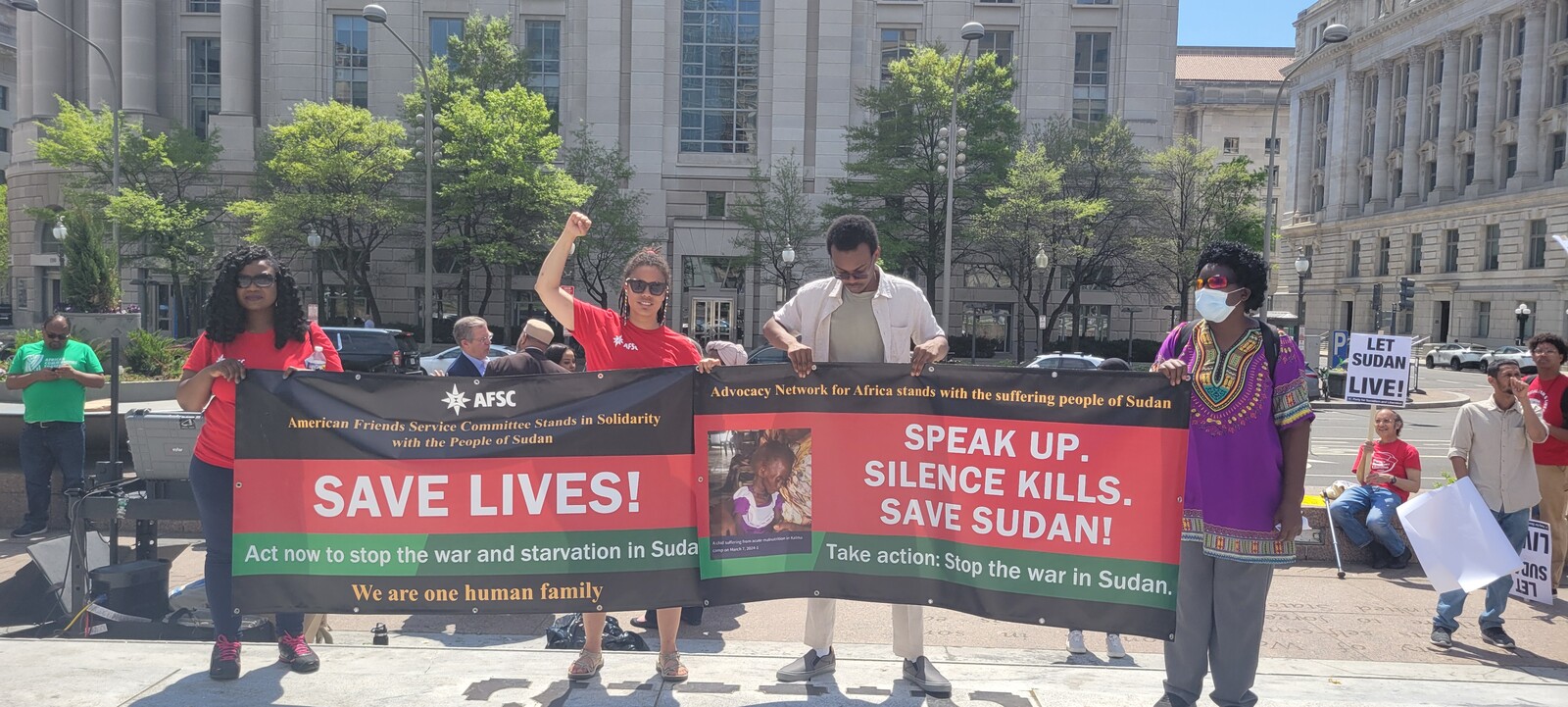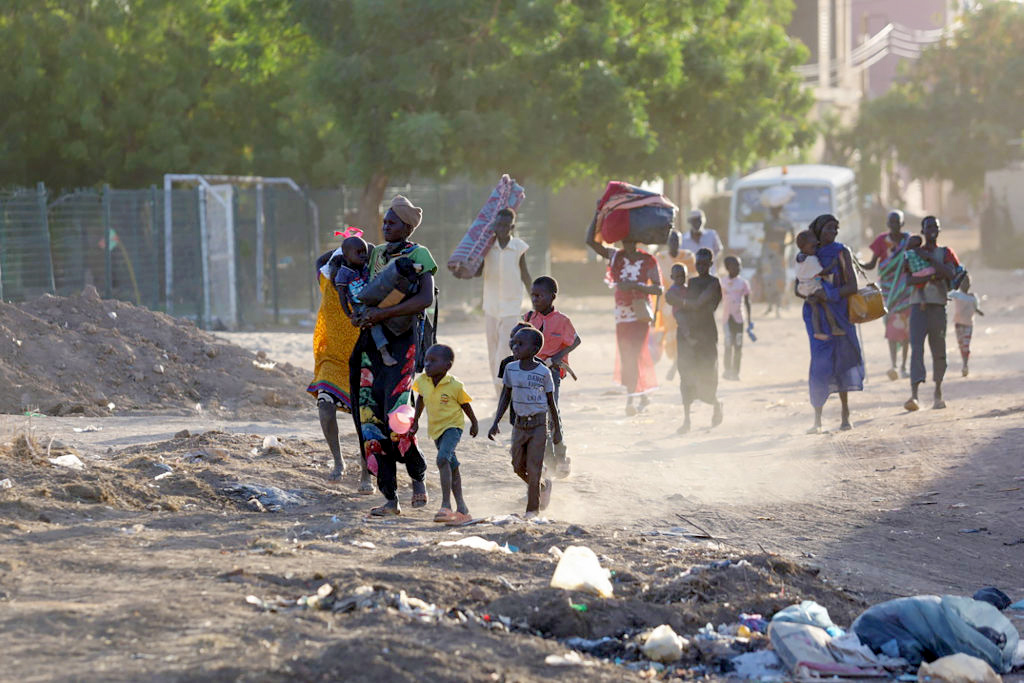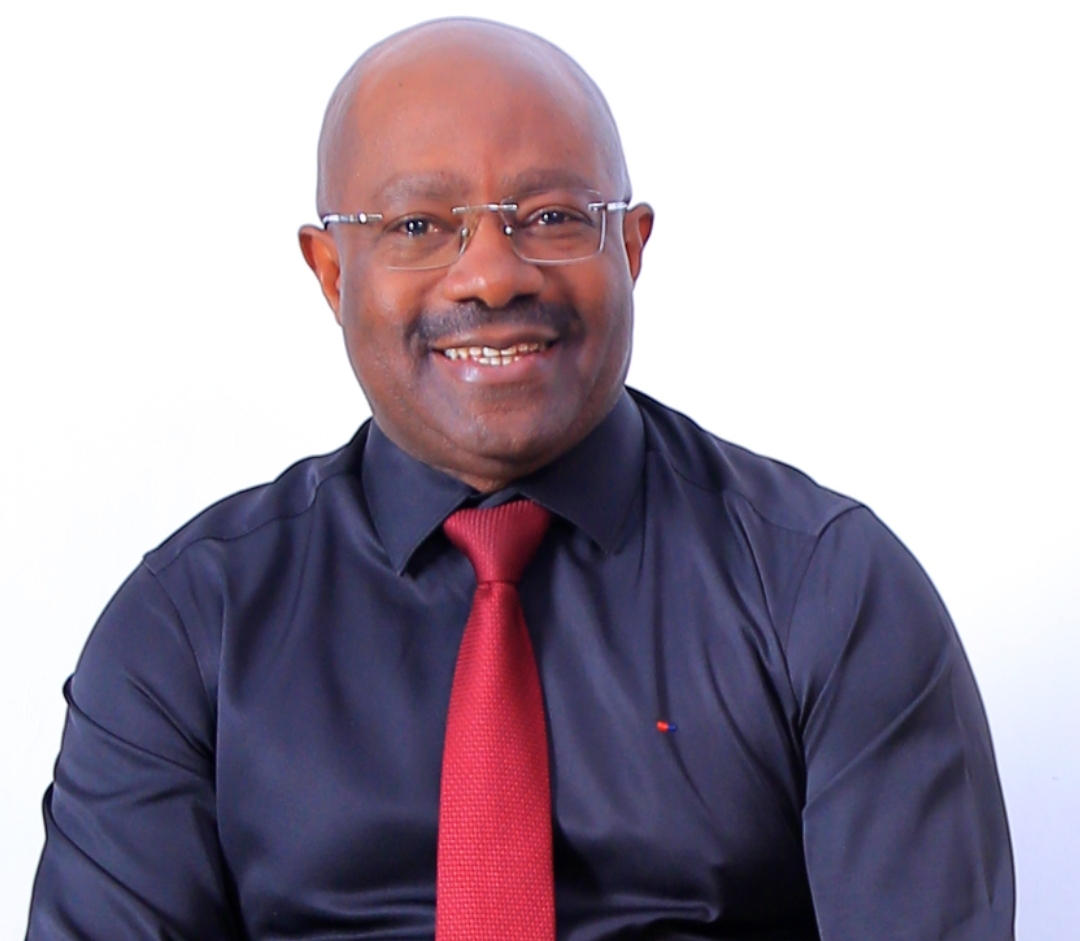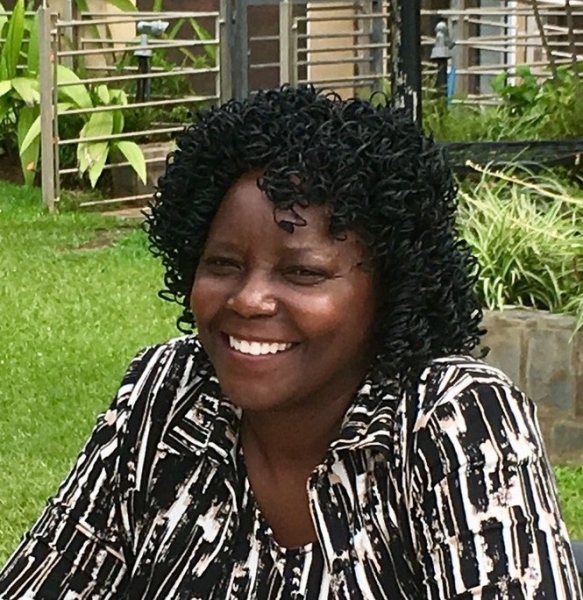
AFSC staff at an interfaith action calling on the Biden administration to help end the war in Sudan.
The war in Sudan is a humanitarian crisis that demands our immediate attention and action. What began as a power struggle in April 2023 has become a full-scale genocide. More than 60,000 people have been killed. Over 12 million have been forced to flee their homes—making Sudan the world’s largest displacement crisis.
In October 2025, El Fasher—the last government-held city in Darfur—fell to the paramilitary Rapid Support Forces (RSF). Civilians face the immediate threat of mass executions and other atrocities. Satellite imagery and video have shown evidence of these horrors—red-stained earth and bodies visible near RSF vehicles.
The human toll will only continue to grow. Yet global media coverage remains sparse, and much of the international community has ignored this crisis. This is a stark contrast to the global outcry during the Darfur crisis in 2003.
Today, it is crucial for both the U.S. and the international community to take decisive action toward achieving a peaceful resolution to this devastating conflict. Here are four things you need to know.
1. The war is the result of an escalating power struggle between Sudan’s military forces, exacerbated by external players.
The conflict is rooted in a complex web of competing forces vying for control in Sudan amid longstanding political unrest and ethnic tensions. Since the 2003 Darfur crisis, the country has continued to grapple with widespread violence, mass displacement, and urgent humanitarian needs exacerbated by environmental disasters like floods and droughts.
The war in Sudan pits the Sudanese Armed Forces (SAF), led by General Abdel Fattah Al-Burhan, and the paramilitary Rapid Support Forces (RSF), led by General Mohammed Hamdan "Hemedti” Dagalo. In 2019, the SAF (which then included RSF) took control of Sudan in a coup that overthrew then-President Omar al-Bashir. The RSF grew out of the Janjaweed, a militia group that committed atrocities in Darfur during al-Bashir’s regime.
However, the struggle for power is exacerbated by external actors that are exploiting the conflict for access to Sudan’s rich natural resources, including gold, oil, and farmland. These nations are providing arms and funding to prolong the war. Countries like the United Arab Emirates (UAE) support the RSF, while Iran and others back the SAF.
In April 2023, the tensions between the military factions erupted into open conflict. The violence was fueled by disagreements over integrating the RSF into the formal military as well as a failure to establish a government led by civilians. The war began in Khartoum before spreading across Darfur and beyond.
Since October 2025, the RSF has also declared a parallel government in Nyala, further fragmenting the country and obstructing any path to peace.
2. The United States has officially recognized this as genocide.
In January 2025, the U.S. government declared that the RSF committed genocide and war crimes against non-Arab minorities in Darfur. The SAF has also been implicated in war crimes.
Although the death toll has surpassed 60,000, some estimates suggest more than 150,000 people have been killed. Each passing day brings more lives lost, injuries, and accounts of rape and sexual violence used as weapons of war.
On Dec. 6, 2023, Secretary of State Antony Blinken made a damning determination, declaring the involvement of the RSF and allied militias in crimes against humanity and ethnic cleansing. This determination also implicated both the RSF and SAF in acts of war crimes.
Reports and videos—often filmed by RSF troops themselves—document torture and targeted killings of people fleeing El Fasher based on their tribal identity. One video showed an RSF member torturing and hanging Qisma Ali Omer, a displaced person from Zamzam Refugee Camp.
In April 2024, the U.S. ambassador to the United Nations, Linda Thomas-Greenfield, emphasized the gravity of the situation, stating, “History is tragically repeating itself in Darfur, spiraling into an abyss of unimaginable suffering.”
In her address to the U.N. Security Council, she urged nations to stop sending weapons to the conflicting parties.
Niemat Ahmadi, president of Darfur Women Action Group and an AFSC partner, implored Security Council members to recognize the urgency of protecting civilians and delivering vital humanitarian aid to avert further disaster.
3. The humanitarian situation has reached catastrophic proportions.
Sudan now faces the world's largest displacement crisis. Over 12 million individuals have been forced to flee their homes, with approximately 8 million internally displaced and another 4 million seeking refuge in neighboring countries like Chad, Ethiopia, Egypt, and South Sudan.
Famine was officially declared in late 2024. As of mid-2025, over 600,000 people are facing acute food insecurity and face a high risk of death. About 30 million Sudanese—including 16 million children—urgently need humanitarian assistance.
In Khartoum and other regions, essential services and infrastructure have collapsed. Hospitals and clinics have shut down. Thousands of schools remain closed, depriving over 19 million children of their right to education. Deadly diseases are spreading unchecked.
Humanitarian organizations' efforts are severely armed group blockades, attacks on aid workers, and access restrictions. Their efforts remain critically underfunded, leaving millions of civilians without the support they desperately need.
The humanitarian crisis has also been affected by cuts to U.S. foreign aid. In 2025, the Trump administration suspended most aid to Sudan except emergency relief, leading to more clinic closures and exacerbating shortages. Despite a September 2025 court order mandating the release of aid, these congressionally approved funds remain largely unavailable to Sudan.
4. The United States must act now to halt this devastation.
The people of Sudan cannot wait another day as this genocide continues. The U.S. and the world must take immediate action today.
As a Quaker organization committed to peace and justice for all people, AFSC calls on the U.S. government to:
- Publicly condemn the RSF’s takeover and the SAF ethnically motivated killings targeting non-Arabs in Al-Jazirah state, and work with the international community to end the genocide.
- Restore and expedite all U.S. humanitarian aid to Sudan, ensuring food, medicine, and essential services reach all civilians.
- Establish protected humanitarian corridors to allow safe passage and unhindered access for aid delivery.
- Hold accountable the United Arab Emirates and other external sponsors fueling the conflict through arms and funding.
- Mobilize emergency civilian protection and pursue strong diplomatic efforts for an inclusive peace process.
In addition to supporting diplomacy, the U.S. must champion an inclusive peace process that addresses the root causes of violence. Engaging women, youth, civil society, religious leaders and other is essential to establish peace, address harms, and prevent future conflicts.
Silence is complicity. Millions of lives depend on choices made in the days ahead.
How you can help
Join AFSC today in drawing attention to this crisis. By raising our voices and advocating for action from the U.S. government, we unite in solidarity with our brothers and sisters in Sudan who continue resisting genocide in the hope of a more just, peaceful future.
The world cannot wait. Lives can be saved—if we act now.
Send a message to Congress today!


